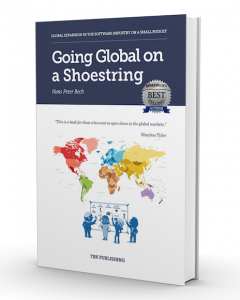Will There Be More Remote Working after the Pandemic Is Over?
Can you run an international company with over 1,000 employees all of whom work remotely? We could do it before, and not least during the Covid-19 pandemic, so we can probably continue to do so.
My latest book, Going Global on a Shoestring, includes case stories from several companies that do not have physical offices. At least not as we usually know it. Employees are spread across the globe and decide for themselves whether they want to work at home, in a café, in a shared office or some other place. Often they also decide for themselves when they want to perform their job-related activities. I call such operations virtual companies.

The virtual option is available when you do not have to meet face-to-face with your customers or colleagues, and when your work does not require you to be in a particular location. Example: The barista at the café where I write this post cannot work remotely, but I do.
Before discussing the subject in more detail, I should emphasize that I exclusively deal with the software industry. Activities in our industry do not require laboratories, factories, warehouses, shipments, service vehicles, repair shops, retail outlets and many of the other physical entities on which other industries have to rely. It also means that in the software industry, the virtual operating format begs to be tested.
The 20-20-60 rule
During the Covid-19 pandemic, I have asked everyone I have come across, domestically and internationally, how they felt about working from home. If we start with companies that did not use the remote format before the pandemic, then the rule seems to be that 20 per cent hate it, 20 per cent love it, and 60 per cent would like to switch between the two options.
If you are looking for people for jobs where they exclusively have to work remotely, then apparently at least 20 per cent of the qualified candidates would be interested. Maybe even very interested.
Remote by design

This blog uses the CMS system WordPress developed by the company Automattic. They have over 1,170 employees working out of 76 countries speaking 93 languages, of which English is the common denominator. The case is well documented in Scott Berkun’s book The Year Without Pants: WordPress.com and the Future of Work. If you have an appetite for more inspiration about virtual companies, then you can also read the book Remote: Office Not Required, by Jason Fried and David Heinemeier Hansson from Basecamp.
WFH (work from home) and Remote Working were growing phenomena even before the pandemic arrived. When we had to shut down the offices and ask people to work from home, even more were exposed to the format. Both managers and employees had to figure out how to make it work – and at the same time, caring for their kids who couldn’t go to school either.
My prediction is that going forward we will see many more virtual companies, who will offer attractive employment conditions and that such jobs will become more and more sought after.
When people-management is not your thing

The Danish software company XINK works 100 per cent virtually and has even built up an organization consisting exclusively of freelancers.
XINK became a virtual company primarily because neither of the two entrepreneurs, Bjarne Mess and Jesper Frier, had a preference for the people-management obligations. They were well aware that without a team, they could not grow. The solution, therefore, became a model that does not require much people-management.
In this respect, XINK does not differ significantly from thousands of other companies, where the owners do not find people-management the most exciting obligation in this world, and where they also do not have ambitions of building global empires. For such people, the virtual format is both attractive and ideal.
Pseudo-work rarely occurs in virtual companies
Are you familiar with the term pseudo-work? It’s a phenomenon we have been discussing for some time in Denmark. In short, it is work that doesn’t create any value.
If pseudo-work is a big problem in many companies, why does it not occur so often in virtual companies?
Now, pseudo-work is not a phenomenon that is easy to spot, readily measurable and whose magnitude can be expressed in precise statistical terms. Nevertheless, I believe that several factors make unnecessary work less frequent in a virtual business.
Participants are measured on their contributions
In a virtual company, it makes no sense to arrive early and go home late. No one will notice. All the common tricks used to appear busy and important in the physical workplace do not work virtually.
We avoid the talking heads

At the risk of being accused of being insensitive, I will claim that most physical workplaces are populated with staff (among the 20 per cent that loves being in the office?) who spend significant time on activities that are not related to their jobs. Many are primarily happy with their jobs because they like their colleagues and not because they find the work meaningful and exciting. In a physical workplace, this type of social lubrication is certainly not without significance for the culture and thus, to some extent, the productivity.
The virtual business, on the other hand, is attractive to the introverted personality who enjoys doing the work but does not need to hang around the water cooler all day. People with large unmet social needs, seldom seek employment in jobs where they have to work remotely.
Knowledge sharing and cross-functional collaboration
When you do not meet physically every day, you have to organize onboarding, knowledge sharing and cross-functional collaboration proactively. Therefore, it is my experience that it works better in the virtual setup than in the physical one, where you, to a greater extent, expect it to happen by itself.
The 20 per cent is a much larger share than you may think
Virtual companies do not have heated debates about the pros and cons of working remotely. That decision has been made once and for all and is not up for discussion. Those who apply and get hired prefer the format. The virtual company, therefore, taps into the twenty per cent who enjoy not having to commute and show up at an office every day.
When both the employee and the company’s geographical location is irrelevant, both parties have far more options than if the work were to take place at a fixed geographical location.
Imagine you are a software developer and speak reasonable English. You can now apply for jobs in virtual software companies worldwide. Similarly, the virtual enterprise has access to a much larger labour market. Both parties benefit tremendously from the virtual format.
Digital nomads and the gig economy
I admit to being somewhat biased because I have worked remotely for many years.

As an international business developer, I used to always be on the go. Before we got the internet, the communication with the office and my colleagues took place by phone and fax. When I was busy with a project on the other side of the globe, staying in touch was both expensive and inconvenient. With email, instant messages, Skype and web conferencing, it became both easier and more affordable.
I received my last payslip in 2001, and since 2005 I have worked exclusively gig-oriented. Although I have always had fascinating and well-paid jobs, the recent 15 years as a consultant without a permanent workplace and a fixed monthly salary have been by far the best.
This desire for adventure, freedom and self-determination is growing, and if your qualifications are in demand, then both the gig-model and the virtual work format are attractive.
Estonia and Croatia take the lead
In December 2014, Estonia established a program that offers foreigners access to services such as starting and running a company, having a bank account, performing payments and paying taxes. This means that you can run a business from Estonia without working and living there. Many have already taken advantage of this program.

A similar project is now underway in Croatia, where the effort is initially aimed at allowing digital nomads to stay for extended periods (three to twelve months) without having to go through a bureaucratic process of applying for a residence and work permit.
After the pandemic – when we have all been vaccinated – when we can move freely again, I foresee a sharp increase in both remote work, digital nomads and the gig economy. It is the appetite for adventure and freedom that will make more and more people prefer this format, and it is the need for highly specialized qualifications that will force many companies to embrace a virtual operation.








